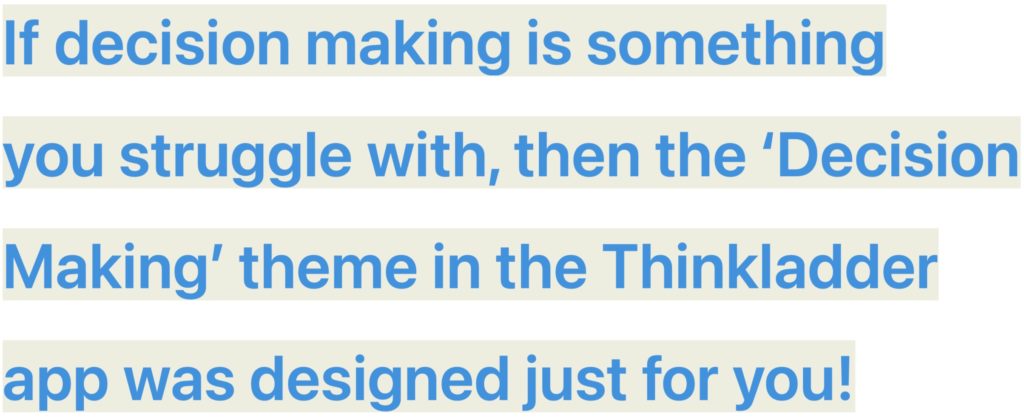Try out the ‘Decision Making’ Theme in the Thinkladder app here:
Every day, we are faced with endless decisions, both small and large – from what to eat for lunch or what to wear to work, to where to go to university or who to date. While some of us are more naturally decisive, there are those of us who find making decisions an anxiety-provoking experience. We might be paralysed by wanting to make the ‘perfect’ choice, or simply overwhelmed by the amount of data we face.
If we want to face decisions with more confidence, it’s valuable to discern the limiting beliefs that are feeding into our decision anxiety. These might be something like, ‘I can only act when I’m 100% certain,’ or, ‘There is one right option, all the rest are wrong’. Once we have pinpointed these beliefs, we can then challenge them. We can strengthen beliefs that better support our confidence in decision-making.
If decision-making is something you struggle with, then this theme was designed just for you!
Insights from the Theme
All I can do is make the best decision I can with the information at hand.
Practical tips to help you navigate the decision-making process:
Define it: Identify the problem or goal you’re trying to address. Is this a decision that needs a lot of thought and planning, or is it something simple I can address without a lot of forethought? Breaking down the decision into specific components can make it easier to tackle.
Gather information: Collect all the relevant information – this may involve conducting research or gathering data and facts. The more information you have, the better equipped you’ll be to make an informed choice.
Identify your values and priorities: Consider any personal values and priorities that may influence your decision. Reflect on what matters most to you and how different options align with your values. This can provide clarity and help you make choices that are in line with your core beliefs.
Evaluate the pros and cons: Make a list of the potential benefits and drawbacks of each option. Assess the potential risks, rewards, and consequences associated with each choice. This exercise can help you weigh the factors involved and make a more balanced decision.
Consider long-term implications: Think about the long-term implications of your decision. Consider how it may impact your future goals, relationships, and overall well-being. Sometimes, a decision that seems favourable in the short term may have negative consequences in the long run.
Set a deadline: Avoid excessive ‘analysis paralysis’. Give yourself a reasonable timeframe to make the decision. Having a clear timeframe can help you stay focused and make progress towards resolution.
Don’t forget the basics:
Break it down: For complex decisions, consider breaking them down into smaller, manageable steps. Focus on making one decision at a time rather than getting overwhelmed by the bigger picture. This can help simplify the process and make it more manageable.
Trust your intuition: While information and evaluation are important, trust your gut instincts. Pay attention to your intuition and listen to that inner voice guiding you. Sometimes, your intuition can provide valuable insights and guide you towards the right decision.
Seek different perspectives: Seek input from trusted individuals who have different perspectives or expertise. Discuss your options with friends, family, mentors, or professionals. Others can provide valuable insights and help you see things from different angles. However, remember that the final decision should be yours.
Embrace, accept, and adapt: Decision-making is a skill that improves with practice. No decision is perfect, and there will always be an element of uncertainty. Embrace the process, learn from your decisions, and be open to adjusting the course, if necessary.
Related topics: People Pleasing, Self-Worth, Anxiety & Comparing Myself To Others.


